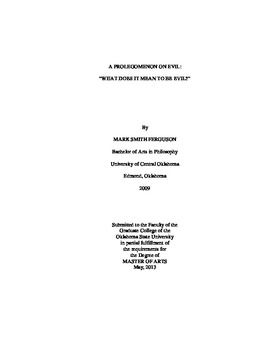| dc.contributor.advisor | Pasternack, Lawrence | |
| dc.contributor.author | Ferguson, Mark | |
| dc.date.accessioned | 2014-09-24T14:18:01Z | |
| dc.date.available | 2014-09-24T14:18:01Z | |
| dc.date.issued | 2013-05-01 | |
| dc.identifier.uri | https://hdl.handle.net/11244/11086 | |
| dc.description.abstract | This thesis is an open-ended inquiry exploring the thought processes within evil actions as it relates to agent judgment and motivation. Largely theoretical in nature, the goal is to better understand the inner workings of evil agency. It is not the purpose of this thesis to ascertain or support a normative ethical theory of evil but rather investigate through metaethics, moral psychology, and ultimately Kantian ethical theory, how evil surfaces in action. That being said, the question which occupies this thesis is "What does it mean to be evil?" Everyone is familiar with the term "evil," but the notion has many connotations in moral discourse. Chapter one establishes a working definition of evil by considering the ways in which people are generally motivated to act. Evil is conceptualized into two distinct categories: perverse and pure evil. This distinction incites considerable debate--especially the latter conceptualization. Whether purely evil motivations are possible or conceptually coherent will serve to dominate a large part of this chapter and the rest of this thesis. Chapter two supplies a metaethical context to evaluating evil motivations in agents--motivation internalism and externalism. These metaethical positions explore whether moral motivations are fundamentally inherent to one's expressed judgments. In other words, is it possible that moral judgments can fail to motivate someone to act? This added dimension, though, only seems to heighten the controversy because pure evil involves principally choosing to do evil for itself. Motivation internalism seems at odds with certain motivational structures, especially the purely evil agent. By highlighting the conflict between internalism and externalism, the subtleties of agent motivation and judgment lead to a more nuanced account of evil. Chapter three introduces Immanuel Kant's account of evil in Religion within the Bounds of Bare Reason and how it may provide a possible solution to the troubles of motivation internalism. Kant's three grades of evil and subsequent views on diabolism are susceptible to an interpretation that frames pure evil as a quasi-diabolism in which the moral law is motivationally inverted. This solution attempts to expand Kant's account while preserving his fundamental a priori principles. | |
| dc.format | application/pdf | |
| dc.language | en_US | |
| dc.publisher | Oklahoma State University | |
| dc.rights | Copyright is held by the author who has granted the Oklahoma State University Library the non-exclusive right to share this material in its institutional repository. Contact Digital Library Services at lib-dls@okstate.edu or 405-744-9161 for the permission policy on the use, reproduction or distribution of this material. | |
| dc.title | Prolegomenon on Evil : 'What Does it Mean to Be Evil?' | |
| dc.type | text | |
| dc.contributor.committeeMember | Bensen-Cain, Rebecca | |
| dc.contributor.committeeMember | Reitan, Eric | |
| osu.filename | Ferguson_okstate_0664M_12669.pdf | |
| osu.accesstype | Open Access | |
| dc.description.department | Philosophy | |
| dc.type.genre | Thesis | |
| dc.subject.keywords | diabolism | |
| dc.subject.keywords | evil | |
| dc.subject.keywords | externalism | |
| dc.subject.keywords | internalism | |
| dc.subject.keywords | kant | |
| dc.subject.keywords | motivation | |
